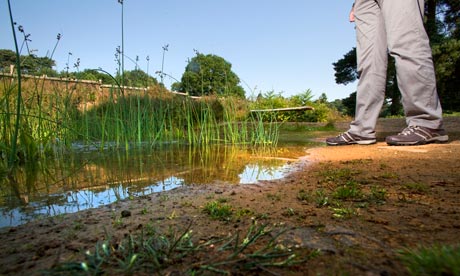- The Guardian, Friday 19 July 2013 08.59 EDT

The plantation pond drying up at RSPB reserve, The Lodge in Sandy, Bedford. Photograph: Graham Turner for the Guardian
After six consecutive days of 30C-plus temperatures and with rainfall at only around 15% of average monthly totals so far, wardens at The Lodge in Sandy, an RSPB nature reserve in Bedfordshire, are working to keep their animals, insects, pondlife and trees well hydrated.
Richard James, wildlife adviser for the RSPB at The Lodge reserve said ponds need to be constantly topped up, otherwise species such as natterjack toads will leave the water before they're fully developed.
All flora and fauna, from bumblebees to bats, need water to stay alive, but some species are finding the heat more difficult than others. For example, house sparrows – who tend not to venture far from their nests – require a source of water nearby.
Conservationists suggest putting out a plate of water in the garden or balcony and filling up ponds. However water straight from the tap contains organic concentrates which can be toxic to certain animals, James said. Water left to stand for a day in a bucket is ideal.
Like humans, birds and animals need to keep their body temperature below lethal temperatures and most do so by panting. At high temperatures, they can rapidly become dehydrated and can die within a matter of hours.
Staff at a nature reserve in Kent this week even witnessed a chaffinch drop dead in front of them. Tim Webb from the RSPB said that although it was rare to witness birds dying from the heat, large numbers will have perished. "Most birds will die hidden in thick shrubbery so it's very unusual to see a chaffinch collapse like that outside the shop. But this bird was one of hundreds, if not thousands, that won't have made it through the heatwave."
Read More Here

No comments:
Post a Comment
Hello and thank you for visiting my blog. Please share your thoughts and leave a comment :)